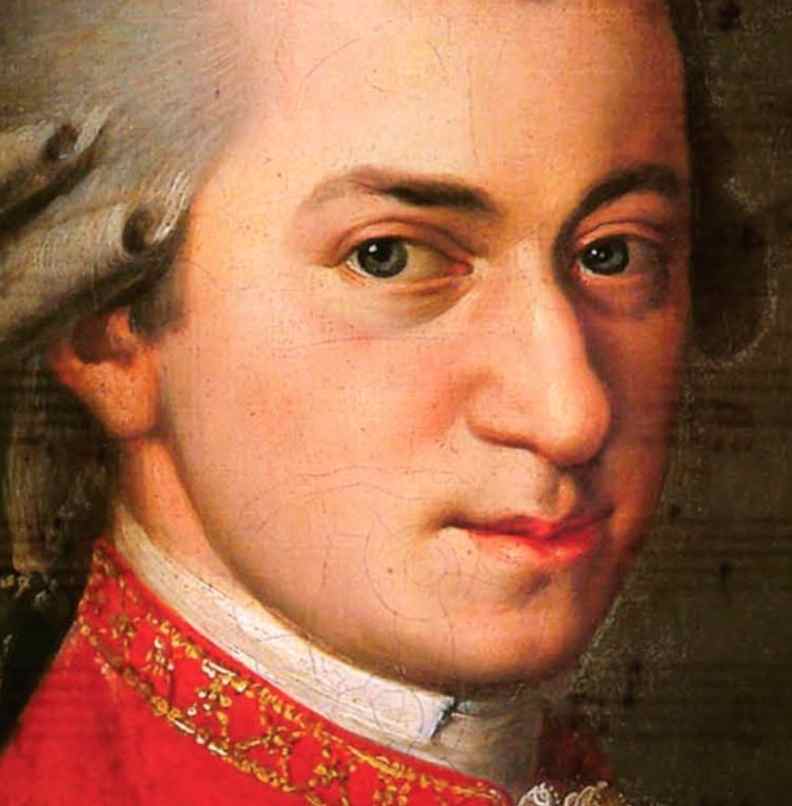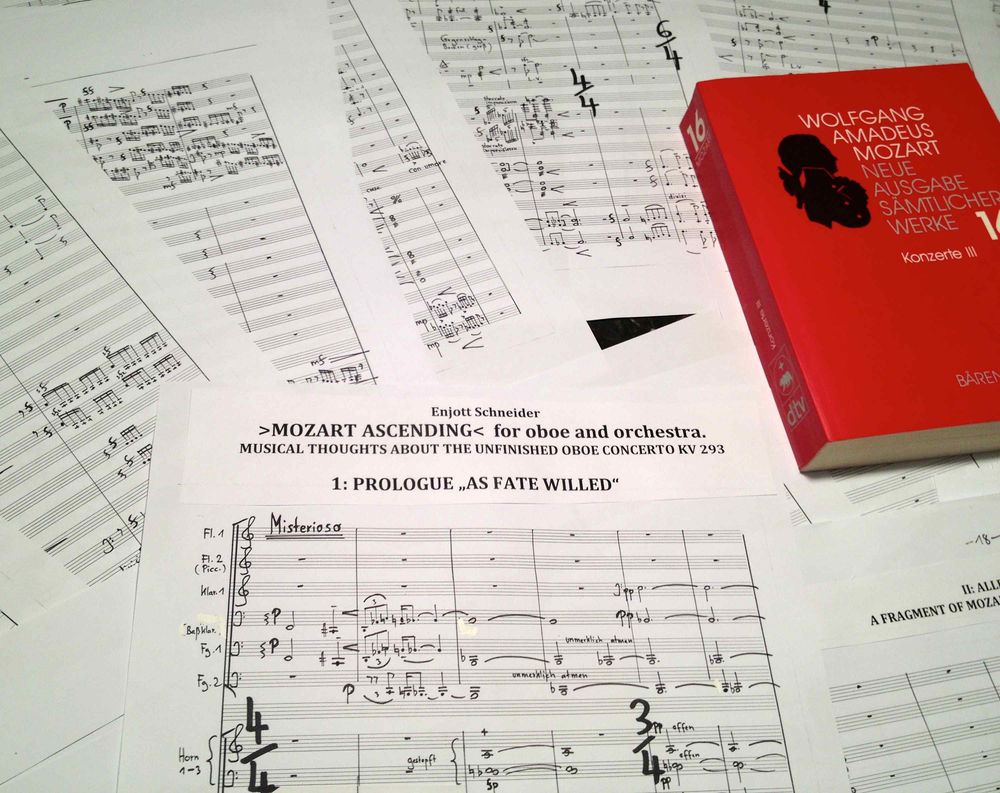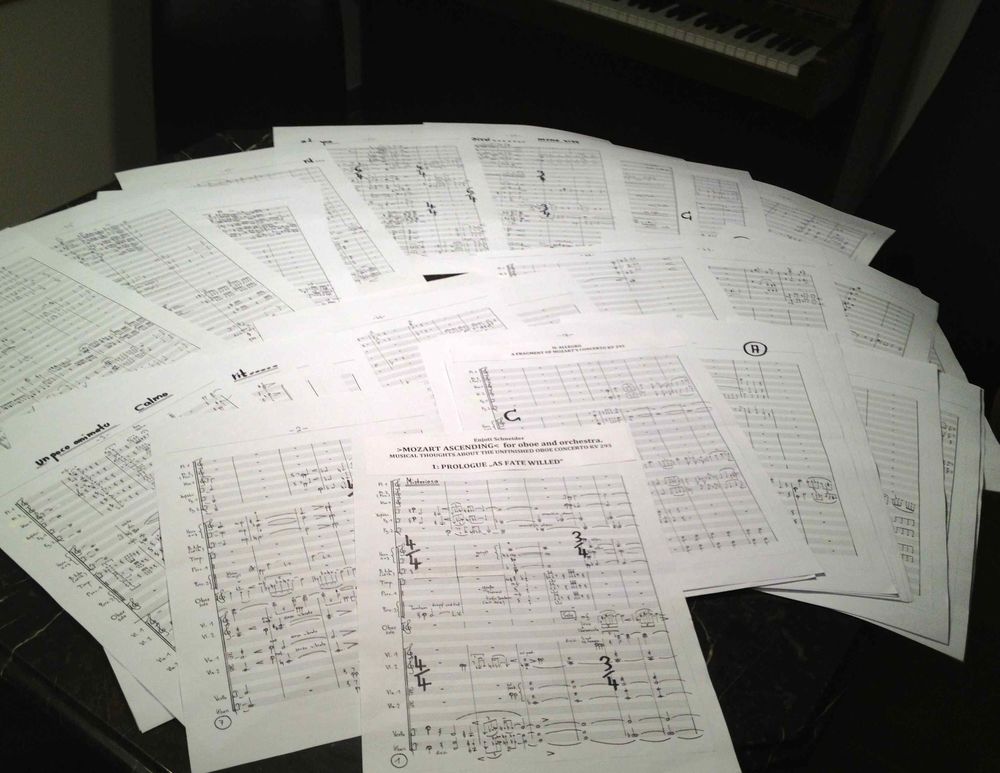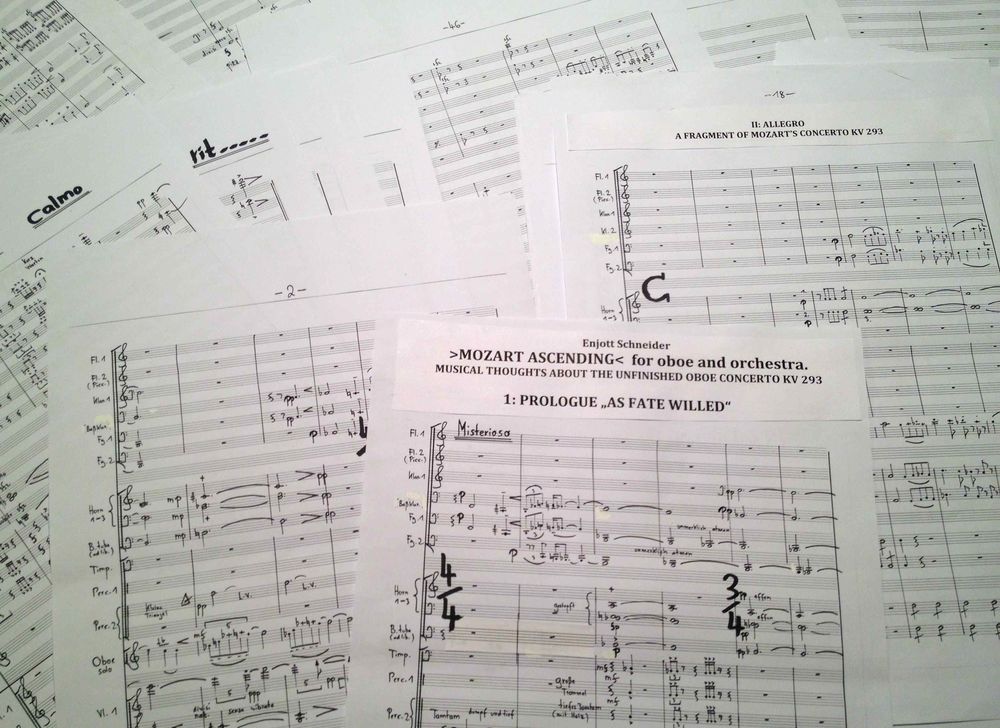
Category: Symphonic / Orchestral
MOZART - ENDLESS MYSTERY!!! - Based on the reconstruction of a fragment of the Oboe Concerto KV 293 - which was written at the death of his mother but unfinished - the question arises:
"Who was this Wolfgang Amadeus Mozart, who confronts us with contradictions, an incomparable dissension, with dark unsolvable riddles and an ingenuity that can only be explained beyond?
Emotions and contrasts are built up around Mozart's original text, shadows and darkness are sought behind its light, associations and fragments may come and go in a dreamlike way. His central fate, however, has a name: "Leopold! His father's hard hand and the hard drill full of privations were the dark side that belongs to the 'wunderkind'. MOZART ASCENDING is an attempt to make such a subtext behind a composition an emotional experience.
In his "Amadeus" film about the figure of Salieri, Milos Forman has vividly demonstrated that the punishing commander in Don Giovanni is nothing other than Mozart's chaining to his father, who throughout his life reminded and controlled him as the epitome of conscience. For this reason, the musical quotations from "Don Giovanni" in the freely associated development of the oboe concerto are of particular importance.
Mozart, the "composer of the supernatural". This is probably where his soul flew - like the lark in Ralph Vaughan Williams' "Lark Ascending" - after an indescribable journey through life.
Translated with www.DeepL.com/Translator
Movements: 1: PROLOGUE „AS FATE WILLED“
2: CONCERTO. ALLEGRO
3: ADAGIO „BITTERNESS OF LIFE“
4: EPILOGUE „MOZART ASCENDING“
The movements are to be played attacca end-to-end
Duration: 25 minutes
Publisher of notes/sheet music: Schott Music. Music for hire , 2019
Instrumentation: Solo oboe and orchestra:
2 flutes (2nd also piccolo) / 2 clarinets (2nd also bass clarinet) / 2 bassoons / 3 horns / tuba (ad lib.) / kettledrum / 2 percussionists.
String orchestra as symphonic as possible (Vl1+2 Vla 1+2 Vc Kb)
Solo instruments: Oboe
Introduction: MOZART, THE MYSTERY
Mozart's oboe concert 'F-major KV332', that is only available as a short fragment, is more complex in the formal dimensions of the orchestra exposition than the other concerts for brass instruments - a beautiful music that is surrounded by a great secret: „Why was such divine music never finished?“, „Where and in what way is there a mental connection to the life of the composer?“ And again and again: „Who was this Wolfgang Amadeus Mozart who confronts us with contradictions, an incomparable inner conflict, with dark, insolvable mysteries and an ingenuity that can only be explained in the afterlife?“
This is exactly what MOZART ASCENDING is trying to „investigate musically“: Emotions and contrasts are created around the Mozart original. Behind its light, shadow and darkness are sought. Associations and fragments move in and out just like in a dream. Labyrinths are crossed. There seems to be an almost cosmic power associated with the life of Mozart in the stress field of endless joy and beauty on the one hand and deep sorrow and the darkest depression on the other hand. This power seems to be unfathomable in our limited human vocabulary. Let's call it simply „destiny“ (lat: „fatum, fortuna, sors“, engl.: „fate, destiny“, franz.: „destin, sort“, ital.: „destini, fato, sorte“). In my opinion, this destiny has a name: „Leopold!“. The tough hand and the drill of deprivation by the father were the dark side of growing up. This dark side seems to be inevitably tied to the 'Wunderkind', just like a law of nature: the brighter the light – which we are so incredibly grateful for – the darker the shadow behind it. Rainer Maria Rilke best described the fate that the childhood creates for the entire life of a person in his "Glaubt nicht, Schicksal sei mehr als das Dichte der Kindheit" (Don't believe that destiny is more than the concentration of the childhood)(„Duineser Elegien“), as well as in his formula "Kunst ist Kindheit nämlich" (Art is childhood). „Leopold?“ – weren't the escape to beauty and dematerialised cheerfulness, the turn to women and gambling, yes and even the transcendency and the climbing to divine spheres all nothing but mere attempts to confront the functional realism and the dominance of the father principle with an own world? This fateful element seems to be the subtext and the double bottom in all of Mozart's works. MOZART ASCENDING is an attempt to make this subtext emotionally perceivable as part of a composition.
Milos Forman has shown impressively in his movie „Amadeus“ with the persona of Salieri, that the punitive commander in Don Giovanni is nothing else but Mozart's linkage to his father who was the embodiment of the Mozart's conscience during his lifetime, controlling and warning him at all times. This is why quotations of the musical 'Don Giovanni' in the freely associated execution of the oboe concert carry a special meaning.
It is scientifically proven that the fragment KV293 was created in autumn of 1778 (e.g. based on the music paper used for the autograph). 1778 was a year in Mozart's life that was defined by fate and a difficult period of darkness: after the archiepiscopal banishment from Salzburg he travelled - for the first time without his father! – alone with his mother to Paris to try his luck as a free artist. It was a rather depressing journey. In addition to the unsuccessfulness with regard to his career, his mother Anna Maria died on the 3rd of July in the Rue du Sentier 8 in Paris. A catastrophe. A shattering fateful moment in Mozart's life that he described in some of his letters. Was the composition of the oboe concert F-major that followed that tragic event an attempt made by Mozart to escape to a world beyond reality? Why did he - who is like nobody else the 'composer of the afterlife' - not succeed and ended up discontinuing the composition? So many questions ... that made it worth investing a lot of 'musical thought'.
The fact that I always stumble 'across Mozart' when I compose has probably something to do with the mysterious double standards of his life and his works. He was definitely so much more than the cheerful composer and the godly child he is often made out to be prematurely (especially in the classical music programs of the mainstream radio). Mozart has many dark sides, especially his preference for ‚Nachtmusiken’ / 'night music' (concerts at night in the municipal park of Vienna), as well as his occult life as a free mason. He wasn't the ‚nice guy’, not particularly attractive, rather short, often grumpy ..... and in contrast to all of that, he always made this divine music? The search for the mysteries of his life has inspired me in several compositions: "Mozart in New Orleans. Variations of ‚House of the rising suns’ for piano", the "Mozart-Mantras" for piano quartet, "At the Edge of Time. Reflections on Mozarts Requiem KV 626" in the original version for orchestra and in the version for symphonic organ, as well as "Kyrie für Chor und zwei Bassetthörner" (Kyrie for choir and two basset horns.
Wolfgang Amadeus Mozart, the „composer of the supernatural“. The supernatural is probably also where - just like the lark in Ralph Vaughan Williams' "Lark Ascending" - his soul travelled after an indescribable life's journey.
World premiere: 12.03.2020, Jena, Philharmony
Performers at world premiere: Jenaer Philharmonie with soloist Juliana Koch (London), Conductor: GMD Simon Gaudenz
Records: WERGO (distribution Naxos), 2019
Performers on recording: Juliana Koch (Solo- Oboe Player of London Symphony Orchestra)
Jena Philharmonics, Conductor: GMD SIMON GAUDENZ





